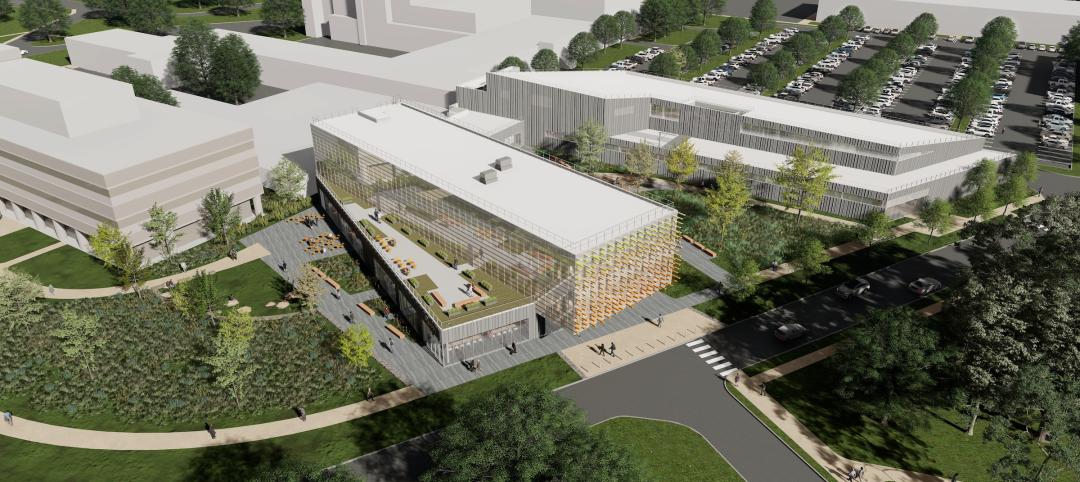The JW Marriott brand holds high standards for its luxury hotels, and the new property in Hanoi, Vietnam, is no different. The 74,384-sm building conveys a distinct Vietnamese flair, with its stylized dragon form inspired by local mythology and the country’s coastline.
Sited next to the Vietnam National Convention Center and the Hanoi Museum, convenient to nearby tourist attractions, the JW Marriott Hanoi greets visitors with a landscaped, semi-circular courtyard. Below this raised entry plaza lies a podium level housing two ballrooms; meeting facilities; dining, bar, and lounge areas; three levels of indoor parking; and back-of-house support functions. Atop the podium, the hotel includes a grand lobby, 450 guest rooms and suites, an executive lounge, a glass-enclosed rooftop swimming pool, and a fitness center.
The hotel is built for ADA compliance, even though no such laws currently exist in Vietnam. Accommodations include wider entry corridors in several rooms and special considerations in bathroom facilities. Elegant finishes are a priority throughout.
“It’s not easy working with Marriott’s standards,” remarks Building Team Awards judge Susan Heinking, AIA, NCARB, LEED AP O+M, Vice President and Director of Sustainability at VOA Associates. Indeed, this Building Team had to navigate a thicket of design requirements, including directives from owner Bitexco Group, Marriott International, and the neighboring Vietnam National Convention Center.
GOLD AWARD
Project summaryJW Marriott Hanoi Hotel
Hanoi, VietnamBUILDING TEAM
Submitting firm: Turner International – Vietnam (CM)
Owner/developer: Bitexco Group
Hotel operator: Marriott International
Architect: Carlos Zapata Studio
Architect of record: Viet Nam National Construction Consultants Corporation
Interior architects: Peter Silling & Associates Hotel Interior Design; DWP | Design Worldwide Partnership
Structural: Leslie E. Robertson Associates
Foundation: GECI
MEP: DSA Engineering Contractors: Hyundai Engineering & Construction; Delta Civil and Industrial Construction; Trung A. Stock ConstructionGENERAL INFORMATION
Project size: 74,384 sm
Construction cost: Confidential at owner’s request
Construction period: November 2009 to September 2013
Delivery method: PM/CM as agent, fast-trackMarriott’s in-house architectural group—responsible for overseeing design of all the brand’s hotels and resorts—was brought in at several stages for input and approval, but adherence to their standards proved difficult when financial problems led to a two-year delay.
Marriott criteria had changed in the interim, and new design styles caused previously selected finishes to be rejected. In addition, the clients decided to reorganize the site to make room for two villas, scrapping plans to build tennis courts and install a significant amount of landscaping.
Even basic communication was a concern, with Building Team members and consultants such as Turner Construction, Carlos Zapata Studio, Leslie E. Robertson Associates, and DSA Engineering scattered among offices in nine different countries. The firms decided early on that English would be the standard for all communications.
Vietnam is still a developing country in many aspects, so there was concern about the availability of skilled workers. Safety was also paramount, with Turner implementing weekly training sessions and audits to reinforce this priority for crews. Figuring out the best way to deploy teams—and to keep employees reporting through delays and cash-flow difficulties—made construction management even more complex.
The Building Team brought in international consultants and engineers when expertise was needed on elements unfamiliar to Vietnamese partner firms, such as the cantilevered design and structural steel construction. Sika, which supplied the waterproofing system for the podium roof, sent employees to train contractors on-site to prevent leaks that could threaten the ballrooms below.
The way the JW Marriott Hanoi came together in spite of the obstacles and difficulty level impressed the Building Team Awards judges. Says juror Matthew Dumich, AIA, of Adrian Smith + Gordon Gill Architecture: “It’s as if someone said, ‘No one knows how to do any of this stuff. Let’s do it anyway.’ And it works.”

A curtain wall system at the podium level brings natural light into the hotel’s café. Elegant finishes were a priority for the owner. PHOTO: NGUYEN HAI VAN / COURTESY TURNER VIETNAM

The structure is constructed on a podium, with ballrooms and restaurants on the lowest floor enjoying riverfront views. PHOTO: VU LONG / COURTESY TURNER VIETNAM
Related Stories
Women in Design+Construction | May 28, 2024
Commerce Department launches Million Women in Construction Community Pledge
The U.S. Department of Commerce launched its Million Women in Construction Community Pledge this month to boost the ranks of women in construction companies. Federal investments are creating a construction boom that is increasing job opportunities for construction and trade workers.
Laboratories | May 24, 2024
The Department of Energy breaks ground on the Princeton Plasma Innovation Center
In Princeton, N.J., the U.S. Department of Energy’s Princeton Plasma Physics Laboratory (PPPL) has broken ground on the Princeton Plasma Innovation Center (PPIC), a state-of-the-art office and laboratory building. Designed and constructed by SmithGroup, the $109.7 million facility will provide space for research supporting PPPL’s expanded mission into microelectronics, quantum sensors and devices, and sustainability sciences.
MFPRO+ News | May 24, 2024
Austin, Texas, outlaws windowless bedrooms
Austin, Texas will no longer allow developers to build windowless bedrooms. For at least two decades, the city had permitted developers to build thousands of windowless bedrooms.
Resiliency | May 24, 2024
As temperatures underground rise, so do risks to commercial buildings
Heat created by underground structures is increasing the risk of damage to buildings, recent studies have found. Basements, train tunnels, sewers, and other underground systems are making the ground around them warmer, which causes soil, sand, clay and silt to shift, settle, contract, and expand.
Sports and Recreational Facilities | May 23, 2024
The Cincinnati Open will undergo a campus-wide renovation ahead of the expanded 2025 tournament
One of the longest-running tennis tournaments in the country, the Cincinnati Open will add a 2,000-seat stadium, new courts and player center, and more greenspace to create a park-like atmosphere.
Mass Timber | May 22, 2024
3 mass timber architecture innovations
As mass timber construction evolves from the first decade of projects, we're finding an increasing variety of mass timber solutions. Here are three primary examples.
MFPRO+ News | May 21, 2024
Massachusetts governor launches advocacy group to push for more housing
Massachusetts’ Gov. Maura Healey and Lt. Gov. Kim Driscoll have taken the unusual step of setting up a nonprofit to advocate for pro-housing efforts at the local level. One Commonwealth Inc., will work to provide political and financial support for local housing initiatives, a key pillar of the governor’s agenda.
Building Tech | May 21, 2024
In a world first, load-bearing concrete walls built with a 3D printer
A Germany-based construction engineering company says it has constructed the world’s first load-bearing concrete walls built with a 3D printer. Züblin built a new warehouse from a single 3D print for Strabag Baumaschinentechnik International in Stuttgart, Germany using a Putzmeister 3D printer.
MFPRO+ News | May 21, 2024
Baker Barrios Architects announces new leadership roles for multifamily, healthcare design
Baker Barrios Architects announced two new additions to its leadership: Chris Powers, RA, AIA, NCARB, EDAC, as Associate Principal and Director (Healthcare); and Mark Kluemper, AIA, NCARB, as Associate Principal and Technical Director (Multifamily).
MFPRO+ News | May 20, 2024
Florida condo market roiled by structural safety standards law
A Florida law enacted after the Surfside condo tower collapse is causing turmoil in the condominium market. The law, which requires buildings to meet certain structural safety standards, is forcing condo associations to assess hefty fees to make repairs on older properties. In some cases, the cost per unit runs into six figures.

















